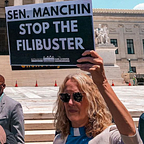Dear Public Theologians: No More Excuses
Washington Post columnist E.J. Dionne issued a plea this week for serious religious intellectuals to renew their leadership in the public square. In these troubling times, we desperately need the wisdom of theologians like the ethicist Reinhold Niebuhr, who graced the cover of Time Magazine in 1948 because of his ability to connect Christian principles with the social and political realities of his day.
Dionne noted that these scholars who call our nation to her better angels still exist. They simply go unheard by a popular media focused on outlandish examples of religion and a politics shaped by the Christian right for four decades. To remedy this deficit, we as religious leaders must actively to reclaim our place in public life. We can’t just wait for attention to come our way.
Having led Faith in Public Life, an organization established to fix this vexing dearth of progressive and moderate faith voices in public debates, I often am given three excuses for why we are missing from the media: 1) journalists don’t want to hear from us, they only want to cover the Christian right; 2) Our denominations and churches face scarce resources and internal strife; 3) Separation of church and state prevents my speaking out (i.e., I don’t want to be like the Christian right, imposing my faith on others).
To the first point, faith leaders can be heard on their own terms and without reducing themselves to tabloid-like sound bites. Look at the success of the Nuns on the Bus campaign led by women religious. Although under scrutiny from the church hierarchy, they focused not on their own institutional woes but on their call to address the needs of the poor. These sisters used the eye-catching humor of nuns taking to America’s highways on an audacious bus to draw attention to the stories of families who would be hurt by proposed federal budget cuts.
We might look at Rev. William Barber’s Moral Mondays, deeply rooted in bringing back the theology of the Civil Rights Movement and reclaiming Christian public witness to call for social justice in reactionary times. Both of these efforts did something bold, and both claimed their unique and very particular faith voice — something we are often afraid to do but must do more often. We could also consider Texas Baptist Mark Wingfield, whose piece Seven things I’m Learning about Transgender Persons, went from Baptist News Global to mainstream media and earned more than a million views. Bottom line: our faith traditions are bold. If we represent that by speaking creatively and fearlessly to the moment, the media will pay attention.
Yes, religious institutions face tough times. But amplifying our voice in the media is the best tool we have to promote pride in our tradition and unity in an era of disillusionment with institutions across the board. The media is one of our best tools for evangelism, and we have too often seen it as our enemy. Polls show that young people are disillusioned by how the Christian right has represented faith. All the more reason for more compassionate churches to publicly show how Christians are challenging racism, welcoming Syrian refugees and supporting LGBT people.
Lastly, the separation of church and state does not limit Christians, Jews, Muslims or secular humanists from speaking to how their beliefs impact their stances on important issues of our day. In fact, the stability of our democracy depends on diverse voices making their case in the public square. We need only recall the witness of Dr. Martin Luther King Jr. to know that. The first amendment was meant to prevent government from violating the religious beliefs of individuals (unless those beliefs do harm or are at cross purposes with compelling government interests like public safety). As we speak from our own traditions, we can model civility and respect toward all beliefs even as we rigorously argue our positions. Our respectful example is needed more than ever in the 2016 election season.
Perhaps we progressive and moderate religious types suffer from a low self-esteem after being trounced for decades by a religion subsumed by politics — the Christian right. It’s time we regain our confidence for the sake of this nation and our faith. Only we can reclaim faith from such a nadir and in so doing help our nation heal from the racism and divisiveness that threatens to tear us apart.
